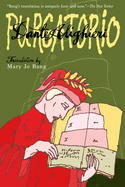[ad_1]
Reading the poet Mary Jo Bang’s new translation of Dante Alighieri’s Purgatorio, I thought of a widely-circulated photograph from the COVID pandemic. An Italian doctor in a surgical gown and two face masks holds a sign reading, “When this hell ends:/…And then we emerged again to see the stars.” The quote is from the final line of the Inferno, the first part of the Commedia of 1320.
Today, as we emerge from another inferno, where do we go and who can guide us? Dante, a medieval Catholic, followed his guide Virgil from hell to purgatory to the edge of paradise. In 2021, is a trip to purgatory still worth the time for believing and non-believing readers alike?
In her rich and exciting translation, Bang shows how this story for all time is a story for our time. Like Dante, who wrote the Commedia not in austere Latin, but in Tuscan dialect, and loaded his poem with references to well-known myths, poems, and current events, Bang writes in a warm and open manner and refers to John Coltrane, T.S. Eliot, and, um, Foreigner. It works brilliantly.
The here-and-now of Bang’s translation makes clear that Dante’s poem is a story about and for the living. The souls Dante meets in purgatory show, in symbolic form, how we might try to purge ourselves of the sins/vices that destroy the social fabric. Souls in hell give up hope and give themselves over to vices that turn them inwards and away from others. Conversely, souls in purgatory hold on to hope and submit to the pain of transformation.
For instance, souls purging themselves of greed lie facedown in the dirt for years. One soul tells Dante:
“What greed does is made clear
Here in the overturned soul’s detox;
The mountain has no pill more bitter than this.
Even as our eyes never looked up,
Fixed instead on earthly things,
So, justice here is immersion in the earth.
Since greed blew away our love of anything
Good, we missed out on doing good works.”
In her translation, Bang emphasizes how, in purgatory, the penance—not punishment—of souls “ma[kes] clear” what a given vice is really about. Greed for earthly things is desire for nothing of worth (dirt) and means turning your back on the world, like living facedown in the mud. To purge yourself of greed, you must endure the pain of dissolving your fantasies and facing the truth of your situation.
Beyond clarifying what vice is about, penance places the soul in a position to act virtuously. The facedown position of the greedy, for instance, begins as a sign of disregard for the rest of creation. Through purgation, however, this position becomes a sign of the humble state of the virtuous soul: The penitent prostrates himself before God and the world.
Similarly, the prideful souls Dante meets walk bent over, carrying boulders. These stones both signify the burden of pride and bend sinners into the humble posture they must learn to assume. With pride in check, the virtuous person can get back to the task of joining others in “doing good works.” Through penance, as opposed to punishment, people reform their souls and rejoin the human community.
Crucially, purgation of vice is not, for Dante, a process of giving up freedom. Rather, it is a process of ordering desires so you are free to live well. A life of disordered desire, a life constantly upended by novel desires, is not a life of freedom—it is a life in hell. In Purgatorio, Dante maps a way out and Bang overlays that map on today’s world.
In addition to her lively translation, Bang includes illuminating notes at the end of each of the poem’s thirty-three cantos. In these notes, Bang explains many of the poem’s allusions, both Dante’s and her own. She also provides a wonderful introduction that addresses all readers, including those new to Dante, and prepares them for the journey. Previewing the trip, Bang writes, “All you have to do is walk up seven flights of steps, circle seven terraces, and you’ll be at the Terrestrial Heaven… That’s only seven stories, a cinch. But hold on, only in fairy tales do wishes work, Snap! Just like that! This is real life.”
Although Bang’s translation of Purgatorio stands on its own, I highly recommend beginning with her equally-great translation of the Inferno, which includes mind-bending drawings by Henrik Drescher. I also recommend Jennifer Frey’s and Matthew Rothaus Moser’s three-part conversation on the Commedia on Frey’s indispensable literature, philosophy, and theology podcast Sacred and Profane Love. Listening to those three episodes can greatly enrich a reading of Bang’s translations.
Mary Jo Bang has given us vibrant, timely translations of Inferno and Purgatorio. Let’s say a prayer in hopes she makes it to Paradiso.

FICTION
Purgatorio
By Dante Alighieri, Translated by Mary Jo Bang
Graywolf Press
Published July 13, 2021
[ad_2]
Source link
